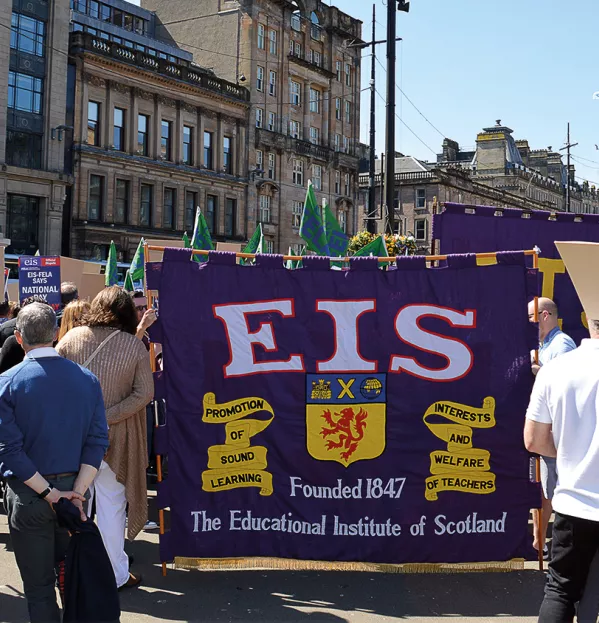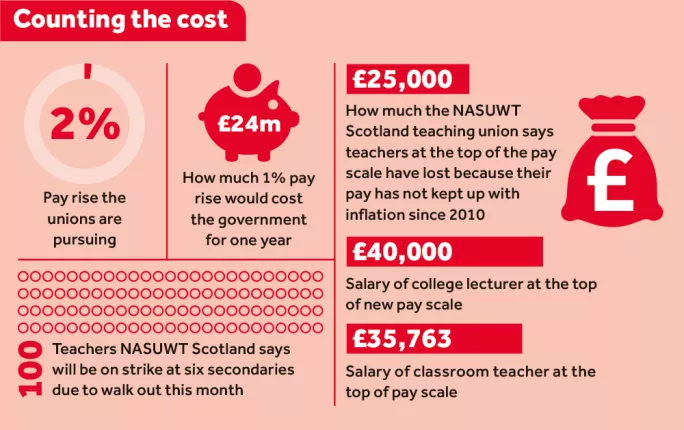Unions state terms for teacher pay increase

Scotland’s teaching unions are demanding a staggered 2 per cent pay rise to conclude negotiations over salaries that have taken over six months, Tes Scotland can reveal.
However, the unions are warning that next year they will lobby for an above-inflation pay rise and that industrial action “remains a possibility in pursuit of a fair pay settlement”.
Teachers’ representatives are demanding a 1 per cent rise backdated to April and a further 1 per cent rise from January 1. Councils are likely to give the proposal the green light, providing the Scottish government agrees to fund the additional 1 per cent - a move that will cost £24 million for one year.
The unions are also looking for a commitment from the government and councils to review the career structure in schools, so that classroom teachers do not have to move into management in order to advance.
Seamus Searson, general secretary of the Scottish Secondary Teachers’ Association (SSTA), said the unions did not want new management roles, but a new ethos that recognised “teachers in the classroom doing their day-to-day jobs are the most important people in school”.
In last week’s Tes Scotland, Stephen McCabe - children and young people spokesman for council umbrella body, Cosla - said that he expected a deal to be reached over teachers’ pay by the end of this month and that the agreement would include a commitment to a McCrone-style review of teachers’ terms and conditions.
The McCrone review, implemented in 2001, led to a 23 per cent pay rise for teachers over three years and the introduction of the chartered teacher role - later scrapped - which incentivised teachers to stay in the classroom.

Cosla will meet to discuss the pay proposal from the teaching unions a week today. However, the meeting will take place the day after the NASUWT Scotland teaching union is set to begin a rolling programme of strike action because of “the significant financial detriment teachers have suffered” - a move that Mr Searson claims could delay a deal.
The teaching unions had hoped teachers would benefit from a pay bump by January, but that was now in jeopardy, he said.
Mr Searson continued: “Employers could view this strike as undermining the offer they are going to make. It could delay their decision and teachers might not get their pay rise in January - they might have to wait.”
NASUWT Scotland is planning one-day strikes in three secondaries in Glasgow on Thursday - St Andrew’s Secondary, Eastbank Academy and All Saints Secondary - moving on to three secondaries in East Dunbartonshire on 30 November: Kirkintilloch High, Lenzie Academy and Bearsden Academy.
The union says more than 100 members will be involved in the first wave of strike action - next term it plans to strike in other schools in other local authorities, including primaries.
Glasgow and East Dunbartonshire councils have said that they are seeking legal advice over the planned walk outs in their schools. A Glasgow City Council spokeswoman said that the council considered the strike illegal and was “taking advice with a view to having this stopped”.
‘Legitimate’ dispute
However, Mike Corbett - a member of the NASUWT Scotland executive and an English teacher at Bearsden Academy, one of the East Dunbartonshire schools due to strike - told Tes Scotland the action was an escalation of the union’s long-standing formal dispute with the government on pay, pensions and terms and conditions and the union was “confident of its legitimacy”.
Mr Corbett added: “Given that we have had no official contact with the employers’ side for months, we are not formally aware of any forthcoming pay deal and seriously doubt that it will be over the current rate of inflation: if it is then we would need to consider our position at that stage.”
The EIS teaching union has said that its focus for “a major campaign” over pay will be next year when the Scottish government is set to lift the public sector pay cap of 1 per cent.
According to Mr Searson of the SSTA, the unions would be seeking an above-inflation pay rise, with a view to securing wages “at least comparable” to college lecturers’. Under the new deal for FE staff - concluded in May after strike action - lecturers at the top of the scale will receive £40,000, compared to the £35,763 for unpromoted teachers.
The new career structure for teachers would, meanwhile, be pursued separately, added Mr Searson. He predicted that new career pathways for teachers would provide “extra money for extra responsibility” but these would not benefit all teachers, which was why the pay claim next year would focus on “substantially increased” pay for classroom teachers.
A Scottish government spokeswoman said that teachers’ pay was a matter for the Scottish Negotiating Committee for Teachers. She added: “Negotiations are ongoing and we will play our part in those discussions.”
You need a Tes subscription to read this article
Subscribe now to read this article and get other subscriber-only content:
- Unlimited access to all Tes magazine content
- Exclusive subscriber-only stories
- Award-winning email newsletters
Already a subscriber? Log in
You need a subscription to read this article
Subscribe now to read this article and get other subscriber-only content, including:
- Unlimited access to all Tes magazine content
- Exclusive subscriber-only stories
- Award-winning email newsletters